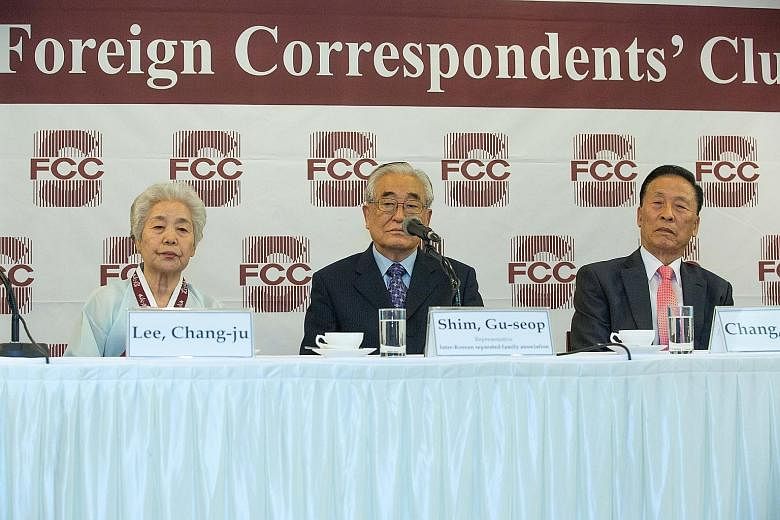Mr Chang Sa In was eight years old when his elder brother enlisted in the army as a volunteer in 1949.
"I remember my mother was very proud that my brother went to the army to protect our country. She carried a photo of him in her bag every day," he recalled at a media briefing in Seoul yesterday.
Unfortunately, that was the last he would see of his hyung (Korean for elder brother), who went missing during the Korean War that broke out the following year and separated the country into two - North Korea and South Korea.
In 2008, Mr Chang received a letter from his brother, sent from North Korea via China, asking to be reunited with his family.
Another letter from the older sibling followed shortly, telling him that he was 78 years old and healthy, and urging him to remain hopeful for a reunion some day.
"My mother was waiting to see my brother all her life, but she died before he managed to establish contact," said Mr Chang, now 74.
The older brother died before their dream could be fulfilled. But Mr Chang has managed to contact his nephew and hopes to get a chance to meet him in the future.
Mr Chang's story is one of 160 included in the tvN documentary Separated Family, which was produced to commemorate the 70th anniversary of the end of World War II. It was aired in South Korea last month and is slated to be shown at upcoming film festivals overseas.
The programme aims to shed light on the plight of a generation of elderly folk waiting to be reunited with their family members in North Korea, and to arouse sympathy in the younger generation who are apathetic to the issue, said chief producer Lee Sang Rok.
For the separated families, time is not on their side, as 82 per cent of them are aged 70 and above, and the official family reunions organised by Seoul and Pyongyang since 2000 allow only about 200 families to meet each time.
So far, only 3,999 families have been reunited. There are more than 66,000 people on the South Korean waitlist for family reunions, according to official data. This figure is half the 129,698 applications received since 1988 when registration for the reunions started, as the rest of the applicants have died.
Madam Lee Chang Ju, 80, is one of the lucky few who was selected for a family reunion last year. Tears welled up in her eyes as she recounted how she fled North Korea during the war with her sister-in-law and two young nieces. Her sister-in-law died during the journey and she sent her nieces to an orphanage as she could not take care of them. They were reunited years later.
"I missed my brother and sister in North Korea, so I applied for a family reunion," said Madam Lee.
She was informed that her siblings had already died, but she got to meet her brother's two sons, who told her that their father lived a good life until his 60s.
She said she felt relieved, as she had heard that her brother was sent to prison and tortured to death. However, she felt "something was amiss" when her nephews kept pestering her to "say hurray to our great leader Kim Jong Un who made the reunion possible".
State-arranged family reunions have often been used by North Korea as a political pawn and can be cancelled by Pyongyang at the last minute as a form of protest, as was the case in September 2013. The next round of reunions is slated to be held between Oct 20 and 26.
Mr Shim Gu Seop, 80, found a way to meet his younger brother in China in 1994. He has since founded the Inter-Korean Separated Family Association to help separated families meet in a third country, like China or Russia.
"The ability to see one's family is a basic human right," said Mr Shim. "It's a great shame that the government cannot do more to help separated families, so we are doing it at a civilian level."

